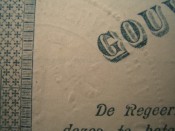ZAR EEN POND GOUVERNEMENTS NOOT, first issue, Pretoria, No. 15723, hand-dated 28/5/1900 and signed by the Treasurer-General, N.S. Malherbe, and the Auditor-General, J.S. Marais. The original blind-embossed seal of authenticity is clearly visible
The note has four vertical folds and 4 tiny pin-pricks in the top left hand printed corner, visible when the note is held up in front of a light source. Otherwise the note is in very good condition indeed with clean edges, no tears.
The ZAR Bank notes 1900 - 1902
Government notes (“Gouvernements noten”) The political and military developments of the Anglo-Boer War and the subsequent economic depression in the Republic are well known.
First issue, Pretoria 1900:
In the disruptive conditions caused by the turn of the tide of war, it is not surprising that the government of the Republic legally sought refuge in paper money to pay its officials and to pay for military supplies. Provision was made for the printing of 1,000,000 government notes with values of £1, £5, £10, £20, £50 and £100. The notes would be redeemable on 1 June 1901.
The first banknotes issued by the ZAR Government during the Boer War were emergency notes issued in Pretoria were dated 28.5.1900 essentially for the payment of Boer Government officials and military supplies. They were issued At PRETORIA under ZAR Law No.1 which the British repudiated immediately (proclamation No.8) saying they would not be recognised except as evidence of war losses. The British later relented and honoured notes passed by the Central Judicial Commission.
They did not circulate long in Pretoria. Ten days later on 6th June 1900 the British marched in under Lord Roberts and occupied the Capital of the Boer Republic. The soldiers marched into the main square with their bayonets fixed - the Boers elected not to engage in a pitched battle and retired to Machadodorp and then to Pietersburg (where a second issue of notes was made). On 1 July 1900, Roberts announced that the British authorities declined to recognise the validity of these notes and declared them illegal. While these notes (and the later issues) were secured by all the fixed assets of the state at 6 per cent interest a year, most never redeemed, because the Republic lost the war. The notes were embossed with the great seal of the Zuid- Afrikaansche Republiek (ZAR). The notes were numbered and signed personally by the Treasurer-General, N.S. Malherbe, and the Auditor-General, J.S. Marais. The difference in the decorative motif is striking. The abbreviation “No.” (for number) was omitted on the earlier notes. The notes were printed on white paper of good quality with a green tinge printing and were known as “green backs” as the general impression of their colour was green. The later series had a blackish over-all colour. These notes became known among the public as “blue backs”, possibly owing to the historical association with the previous green backs.
The wording on the notes reads: "The Government of the South African republic promises to pay the bearer of this note xxx pound sterling, according to law No.1, 1900, of which articles 2 and 3 are printed on the reverse of this note. This note is guaranteed by all fixed properties of the State as defined in Law No.1"
The reverse shows that there was an element of gamble about redemption - but also a six per cent interest per annum. It reads: "Article 2. These notes will have a fixed rate until they are redeemed; their redemption will be conducted by means of a draw, the details of which will be made known later, and will commence on 1st June 1901, when a sum of £100,000 sterling will be redeemed, which will be repeated on the 1st June each year with an amount of £100,000 sterling until the total amount is redeemed. As soon as a note is taken out of circulation and repaid, it will be destroyed by the Treasurer General and Auditor General in the presence of two people appointed by the Government. Article 3. These notes will bear an interest rate of six per cent per annum, payable to the holder in cash every first of June, for the previous year, at the office of the Treasurer General or at a bank appointed by proclamation."
Redemption of the ZAR notes
At the surrender negotiations at Vereeniging on May 15 1902 Lord Kitchener and his team met with General J.C.Smuts (later to fight with great success for the British) and Generals C.R. de Wet, Louis Botha, and others. There it was agreed to redeem notes accepted as genuinely issued by the Central Judicial Commission, whose stamp would be applied to the notes if they met the terms of the ZAR Law No.1 and the holder had given due value for them. But no interest would be paid.
- Size: 116mm x 210mm
- Sold By: Booktown Africana
- Contact Person: Chris Shelton
- Country: South Africa
- Email: [email protected]
- Telephone: 0685615292
- Preferred Payment Methods: Internet banking transfer (EFT), PAYPAL. Regret no Credit Card facility.
- Trade Associations: AA Approved


























